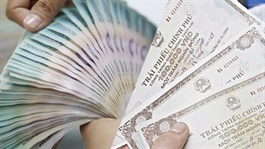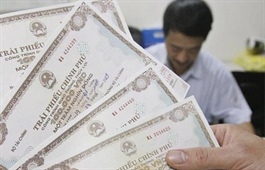Steady pace in bond market despite persistent legal barriers
Steady pace in bond market despite persistent legal barriers
An economic resurgence and elevating appetite for capital mobilisation would factor in a more buoyant corporate bond market this year, despite an increasingly rigid legal corridor.
According to fresh figures from the Vietnam Bond Market Association, corporate bond issuance to the public totalled VND5.5 trillion ($240 million) and nearly VND22.2 trillion ($964.6 million) in the first two months of this year, a growth of 31 and 51 per cent on-year, respectively.
The real estate group currently composes 56.04 per cent of the market structure. The second-largest issuer was the construction companies, which accounted for 28.6 per cent of the overall issuance value, which was buoyed by indications of an economic rebound. Recent statistics from data analyst FiinGroup showed that despite the lingering crisis, bond market growth has continued at a steady pace over the past two years, with some industries, such as real estate, witnessing a rise of 60 per cent.
Le Hong Khang, head of Credit Rating Services at FiinRatings, noted Vietnam’s bond market is now comparable to 15 per cent of GDP. In comparison to other regional peers such as Malaysia (the bond market accounting for over 50 per cent of GDP), and Singapore (more than 40 per cent), the domestic landscape still has tremendous opportunities for improvement.
In 2021, debt instruments became an essential fund mobilisation channel, with an average compound annual growth rate of about 55.4 per cent during the last five years. Moreover, only 4.58 per cent of the total issuance was made available to the public, with the vast majority (more than 95 per cent) going to the private sector.
The banking sector contributed around 35 per cent of the total volume; non-financial sectors represented the remaining 65 per cent. The real estate industry topped the list with 61 per cent of the total market. Notwithstanding, unsecured bonds made up for around 50 per cent of the total amount of bonds issued in 2021, with the remainder being backed mostly by stock and property.
Specifically, individual investors have made significant contributions to the secondary corporate bond market, illustrating their strong appetite.
“Individual investors, on the other hand, are likely exposed to various uncertainties, such as credit risk and default risk, among others,” Khang added. “A considerable demand for refinancing bonds in 2022 is anticipated due to the ongoing revival of the manufacturing and services sectors, as well as the upcoming maturity of outstanding corporate bonds in the period of 2023-2024.”
“As policymakers keep a firm hand on the legal corridor, bond issuers expect rising interest rates in a bid to lure more investors. Thus, the bond interest rate baseline in 2022 would be higher than that of last year,” he said.
Around 300,000 investors have already participated in the bond market, and this number is steadily ramping up, according to estimates from the Ministry of Finance.
Nguyen Thi Thanh Tu, analyst at SSI Securities Corporation, assessed corporate debts that are scheduled to mature in 2022 total VND266 trillion ($11.6 billion), or nearly 19 per cent of all bonds in existence. There is a great deal of demand for this instrument as a result of buoyant production and business activities.
“The yield on corporate bonds may have bottomed out last year, and might begin to rise gradually in 2022,” Tu said. “As deposit rates have climbed, corporate bond rates have almost certainly followed pace. Higher operational interest rates at global central banks and increasing inflation pressure could further reinforce investors’ confidence in higher bond interest rates.”
Tu also cautioned that banks are facing a wider range of constraints for bond-buying initiatives, according to the State Bank of Vietnam’s (SBV) Circular No.16/2021/TT-NHNN dated November 2021 on prescribing the purchase and sale of corporate bonds by credit institutions and foreign bank branches.
For instance, a credit institution is allowed to purchase corporate bonds if it has a bad debt ratio of less than 3 per cent in accordance with the latest classification period of the regulations by the SBV.
Tu noted the aforementioned laws would considerably impair firms’ ability to acquire more funds. Additionally, tougher constraints on bond capital flows (typically 3-5 years in duration) may prompt enterprises to reassess this financing route.























